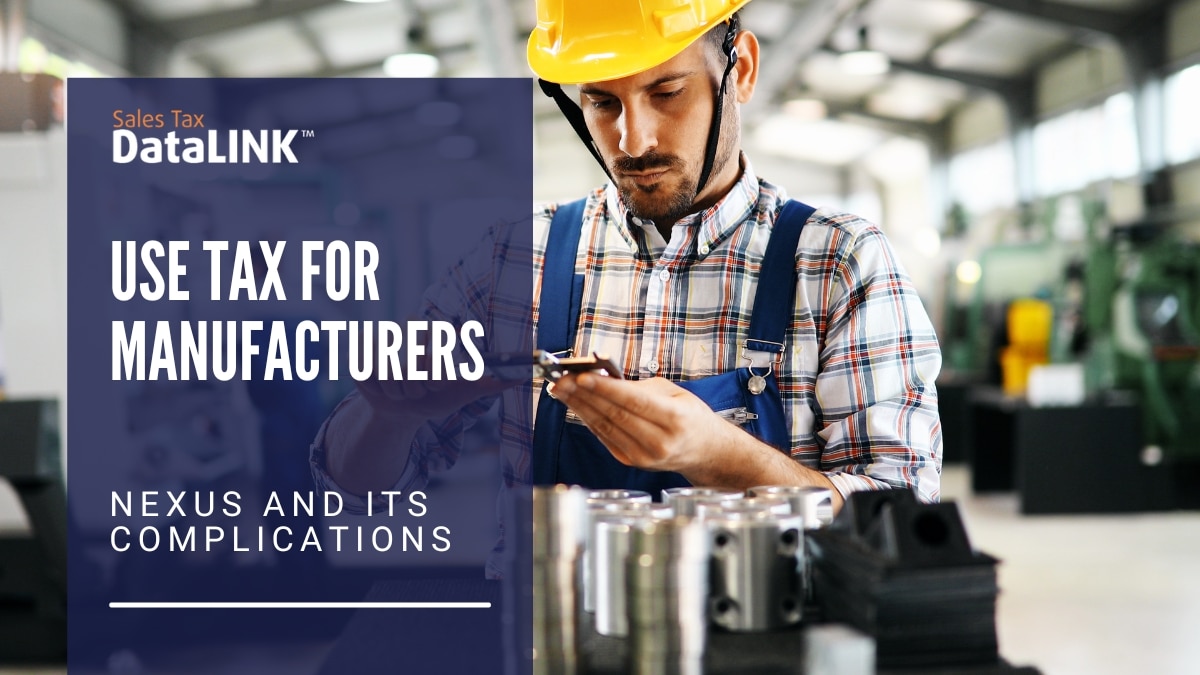Complexities of Use Tax for Manufacturers
As manufacturers engage in business transactions, understanding the intricacies of use tax becomes crucial to ensure compliance and avoid potential financial consequences. Use tax, closely related to sales tax, presents unique challenges for manufacturers when it comes to determining their tax obligations. While sales tax is typically collected by sellers at the time of purchase, use tax comes into play when sales tax is not initially collected. Manufacturers often encounter scenarios where items purchased for exempt purposes end up being used differently, triggering the need for use tax payments. This blog delves into the complexities surrounding use tax for manufacturers, shedding light on its significance, nexus considerations, and the potential impact of non-compliance.
Sales and use tax can be thought of as twins. Metaphorically speaking, of course. They are usually charged at the same rate, and both are calculated as a percentage of the purchase price.
Sales tax is paid at the time of purchase by the purchaser. It’s collected by the seller, and the seller is responsible for remitting the sales tax to the appropriate sales tax jurisdictions, potentially including state, county, and city entities.
However, the sales tax is not always collected at the time of purchase. As a manufacturer, you might be exempt from sales tax on some purchases. Manufacturing machinery, for example, is exempt from sales tax in many states.
Some items are not taxable. This varies from one state to another.
In these cases, where you just don’t owe any sales tax, you don’t have to pay sales tax and you can probably forget about it once you file your sales tax exemption certificate.
It’s complicated
If you buy something without paying sales tax because the item is not taxable, that’s the end of it. But there are other reasons that you might not pay sales tax.
For example, if you buy something because the item you plan to use is exempt from sales tax, but you later use it in a different way, you could be responsible. Say you manufacture a product that uses sugar in production — candy, for example. The sugar you buy to make your sweets is not taxable. You pay no sales tax, and that’s fine.
One morning you head to the break room to grab some sugar for the coffee since you’ve got an important meeting in the conference room. There’s only a spoonful of sugar in the break room container — and you don’t have time to run to the store before the meeting. Resourcefully enough, you refill the container from the sugar used in production.
That pound of sugar is now taxable. You’re using it for administrative purposes, not for manufacturing your product. You actually owe tax on it.
When you bought the sugar, the seller had no requirement to collect sales tax. Now that you’re using it for another purpose, the tax is owed.
This is where the use tax comes in. Since the seller didn’t collect any money as sales tax during the sale, you now owe that money as use tax, because you’re using it.
Some manufacturers believe that they never owe sales tax, because as manufacturers they are exempt. Use tax is where an audit can really hurt. The tax due on one pound of sugar won’t make much difference, but lots of casual repurposing of things bought with an exemption certificate can add up.
Nexus
Another situation in which use tax comes up is when the seller doesn’t collect sales tax even though you or your purchases are not exempt. An online seller who doesn’t have nexus in your state can sell you items without collecting sales tax. You still owe the tax. Once again, it’s in the form of use tax. You are expected to pay it when you file your income taxes.
Until the summer, many if not most online sellers felt no compulsion to collect sales tax. The Supreme Court decision called Quill basically said that any company without a physical presence did not have nexus. A new decision, Wayfair, reversed that ruling. Now states are allowed to require online sellers to collect sales tax. Until everything shakes out, you (and the online sellers) may be uncertain about whether or not sales tax should be collected.
If you didn’t pay the tax as sales tax, however, you will still owe it as use tax. Individual consumers usually don’t bother to calculate and file use tax. States know that enforcing use tax for individual consumers isn’t practical. Most manufacturers aren’t talking about a few hundred dollars a year in unpaid use taxes, though. The sales tax on your $6,000 servo is worth an audit to your state.
The Future of Use Tax
Is use tax on its way out? With the end of Quill, one of the main reasons for the use tax is becoming obsolete. Will states bother to track down that pound of sugar in the break room? Perhaps not.
One thing you can be sure of: Sales Tax DataLINK will keep you up to date on all your sales tax compliance issues. Try us for free.




